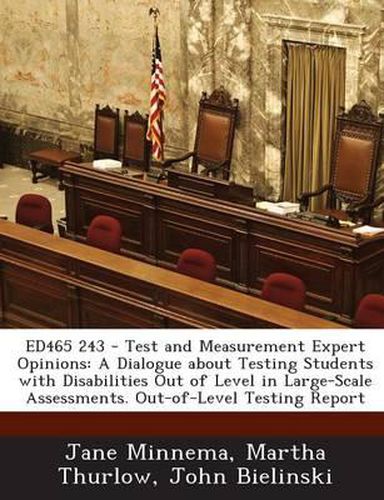Readings Newsletter
Become a Readings Member to make your shopping experience even easier.
Sign in or sign up for free!
You’re not far away from qualifying for FREE standard shipping within Australia
You’ve qualified for FREE standard shipping within Australia
The cart is loading…






Two focus groups of test and measurement experts were held to explore the use of out-of-level testing for students with disabilities. The participants (n=17) included state and federal level assessment personnel, test company employees, and university professors. A content analysis of the narrative results indicated that there was no clear consensus in supporting or not supporting out-of-level testing. Instead, focus group participants were able to adopt numerous perspectives on many contentious issues. Four key areas demonstrate salient patterns in the focus group data. First, discussions reflected multiple issues and varying definitions that are reported in the field through testimonial evidence. Second, there was marginal comfort in equating out-of-level test scores back to on-grade level test scores for reporting purposes when the state test was a norm-referenced instrument. This ttcomfortll decreased when participants discussed criterion-referenced instruments, especially when students were tested more than one level below their assigned grade level. Third, there was general consensus about the need to develop large-scale assessment instruments with broad based content so that more students can be included in the testing program. Finally, opposition to out-of-level testing centered on out-of-level policy concerns rather than psychometric concerns. Appendices include focus group probes. (Contains 13 references . ).
$9.00 standard shipping within Australia
FREE standard shipping within Australia for orders over $100.00
Express & International shipping calculated at checkout
Two focus groups of test and measurement experts were held to explore the use of out-of-level testing for students with disabilities. The participants (n=17) included state and federal level assessment personnel, test company employees, and university professors. A content analysis of the narrative results indicated that there was no clear consensus in supporting or not supporting out-of-level testing. Instead, focus group participants were able to adopt numerous perspectives on many contentious issues. Four key areas demonstrate salient patterns in the focus group data. First, discussions reflected multiple issues and varying definitions that are reported in the field through testimonial evidence. Second, there was marginal comfort in equating out-of-level test scores back to on-grade level test scores for reporting purposes when the state test was a norm-referenced instrument. This ttcomfortll decreased when participants discussed criterion-referenced instruments, especially when students were tested more than one level below their assigned grade level. Third, there was general consensus about the need to develop large-scale assessment instruments with broad based content so that more students can be included in the testing program. Finally, opposition to out-of-level testing centered on out-of-level policy concerns rather than psychometric concerns. Appendices include focus group probes. (Contains 13 references . ).